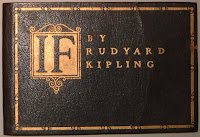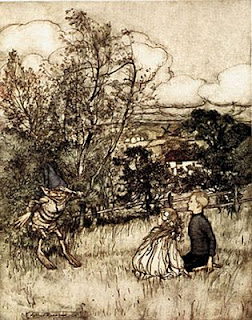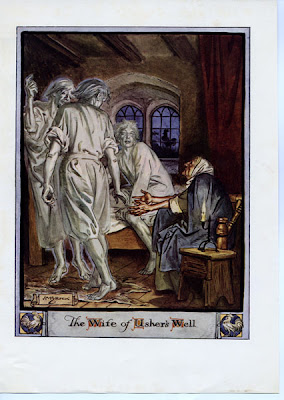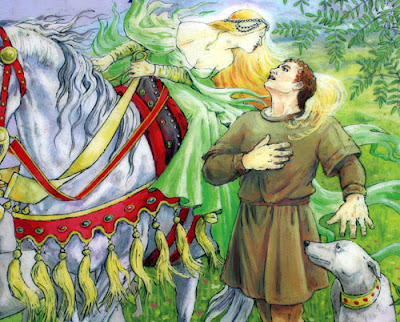I'm a rambler, I'm a rambler from Manchester wayEwan MacColl Manchester Rambler
I get all my pleasure the hard moorland way
I may be a wage slave on Monday
But I am a free man on Sunday
 This month it is 80 years since the famous Mass Trespass on Kinder Scout. A gortex clad posse from the Ramblers association will meet to commemorate the event, but ramblers weren't always so respectable and the campaign to open up the hills used to be about working class struggle rather than middle class leisure.
This month it is 80 years since the famous Mass Trespass on Kinder Scout. A gortex clad posse from the Ramblers association will meet to commemorate the event, but ramblers weren't always so respectable and the campaign to open up the hills used to be about working class struggle rather than middle class leisure. The first shots of the class war to reclaim our land were fired in the nineteenth century. Visionary social reformers like John Ruskin and William Morris had imagined a Utopian future where the land was free to all, and called for the introduction of National Parks.
By the nineteen thirties more radical activists appeared on the scene. For those who worked in the Dark Satanic Mills of Manchester the symbol of the forbidden Eden was the gloomy black massif of Kinder Scout, which they could occasionally glimpse through the smoke of the factories, but which they were not allowed to visit.
There is an old story that does the rounds about a rambler who was on a moor when he met the man who owned it. The rambler asks how this came to be.
“Well,” replied the landlord, “I inherited it from my father, he inherited from his father and so on right back to the first of our family who won it in battle.”
“Right then,” said the rambler. “Get thee coit off and I’ll fight thee for it now.”
It was with such an attitude that the communist influenced British Workers Sports Federation met during the Easter weekend of 1932, at Rowarth, near Glossop. At their camp they decided to reclaim the moors for the working people. Their initial attempt, by climbing onto Bleaklow Moor from Glossop failed when they were confronted by a gang of gamekeepers at Yellowslacks. Ramblers often came out of such confrontations badly injured, and the class system being what it was they could find little redress in the courts. However the group was not downhearted. All they needed, they figured, was more ramblers, and Manchester was full of them.
 And so a week later, on the 24th April 1932, about 400 ramblers met at the recreation ground in Hayfield. Amongst them were my grandparents Claude and Ellen Porter. The intention was to trespass on Kinder Scout itself, but first they rallied at Bowden Quarry, where the modern car park is, for political speeches.
And so a week later, on the 24th April 1932, about 400 ramblers met at the recreation ground in Hayfield. Amongst them were my grandparents Claude and Ellen Porter. The intention was to trespass on Kinder Scout itself, but first they rallied at Bowden Quarry, where the modern car park is, for political speeches.The trespass had been widely publicised and the police were intent on trying to stop the ramblers. The speaker who’d been booked for the day took fright and returned home, so onto a rock leapt 20 year old Benny Rothman to address the crowd.
An unemployed motor mechanic at the time, Benny had got the rambling and the trespassing bug as a teenager by climbing Snowdon equipped only with a sixpenny map from Woolworths. Fed up with the lack of progress that was being achieved by the moderate rambling groups in negotiating better access he helped organise the Mass Trespass to bring the matter to a head in a manner that no-one could ignore or misinterpret. A known radical, the police had been waiting to arrest him at the railway station, but he had cunningly outwitted them by arriving on his bike.
There must have been a touch of Citizen Smith about proceeding as the ramblers made their way up William Clough singing lefty songs. Benny’s best mate was even called Woolfie. Initially the ramblers were on a public footpath, but at a blast from Woolfie’s whistle they all started to scramble up the slopes of Kinder Scout itself.
 The police had by this stage given up trying to keep pace with the trespassers and the twenty or thirty gamekeepers waiting for them on the moorland were overwhelmed by sheer numbers. There were a few scuffles and gamekeeper Edward Beevers fell and hurt his ankle, but on the whole it was fairly undramatic. A hundred yards further on they rejoined the footpath and carried on to meet some other ramblers who’d done it the hard way and started from Edale.
The police had by this stage given up trying to keep pace with the trespassers and the twenty or thirty gamekeepers waiting for them on the moorland were overwhelmed by sheer numbers. There were a few scuffles and gamekeeper Edward Beevers fell and hurt his ankle, but on the whole it was fairly undramatic. A hundred yards further on they rejoined the footpath and carried on to meet some other ramblers who’d done it the hard way and started from Edale. At this point Benny and co. could have got away Scot free, but they figured this would just make them look like criminals. But criminals is what the state intended to make them and Benny and four others were put on trial at Derby Assizes charged with riotous assembly. Benny defended himself showing his talent for the now lost art of working class oratory. “We ramblers, after a hard week’s work in smoky towns and cities, go out rambling for relaxation, a breath of fresh air, a little sunshine. But we find when we go out that the finest rambling country is closed to us, just because certain individuals wish to shoot for about ten days a year.” Not that any of this cut any ice with judge, who enlivened proceedings by asking, after it was revealed one of the accused had a book on Lenin, "Isn't that the Russian gentleman".
A fair jury might have let them off though. However as they found themselves in front of two Brigadier Generals, three Colonels and a pair of Majors they were all five were given jail terms of between two and six months.
 The hero of the day though was Tony Gillett. The son of prominent bankers, he was a good deal Aren't you ashamed of what you did?" Justice Acton was clearly angling for an excuse to let him off.
The hero of the day though was Tony Gillett. The son of prominent bankers, he was a good deal Aren't you ashamed of what you did?" Justice Acton was clearly angling for an excuse to let him off.posher than the other and the only one able to afford a Barrister. This enterprising silk had evidently cut a deal with the judge and when Gillett was asked "
Instead though Gillett stood up before the court and looked the the Judge in the eye and said "No Sir, I would do it again" and got two months.
One of those sentenced was moderate rambler John Anderson. John had actually been opposed to the trespass and had just turned up to see what happened. He was arrested after he had gone to the aid of the injured Beevers. John was to spend the next sixty years protesting his innocence and turning up to heckle Benny at public events. This went on until one day, when both men were well into their eighties, when they met as Benny was trying to open a new cycle path. The Chief Constable of Derbyshire was also there, and when he told John he believed him innocent John was able to go home satisfied at last.
But John wasn’t the only person outraged by the severity of the sentences passed. Moderate ramblers too now took to trespassing and a few weeks later 10,000 walked through the Winnats Pass in the biggest protest yet. Further trespasses followed, but there were no more arrests. The point had been made and reform was now inevitable. In 1951 the dreams of Morris and Ruskin came true when Peak District National Park came into being. Shortly afterwards the first access agreement was reached and nearly 6000 acres of Kinder Scout were opened up to walkers.
Commemorating the trespass is now a regular event. For the 70th anniversary Michael Meacher came up from Westminster to trumpet Right to Roam legislation and the late Duke of Devonshire apologised for the actions of his dad's gamekeepers.
 For the 75th anniversary I managed to bait David Milliband to have a dig at host Mike Harding's opposition to wind farms.
For the 75th anniversary I managed to bait David Milliband to have a dig at host Mike Harding's opposition to wind farms.There's another bash this month, although funnily enough the Tories don't seem to keen to send up a Minister for the day. Perhaps the idea of workers using Direct Action to assert their rights is something they still don't want to be associated with?





















